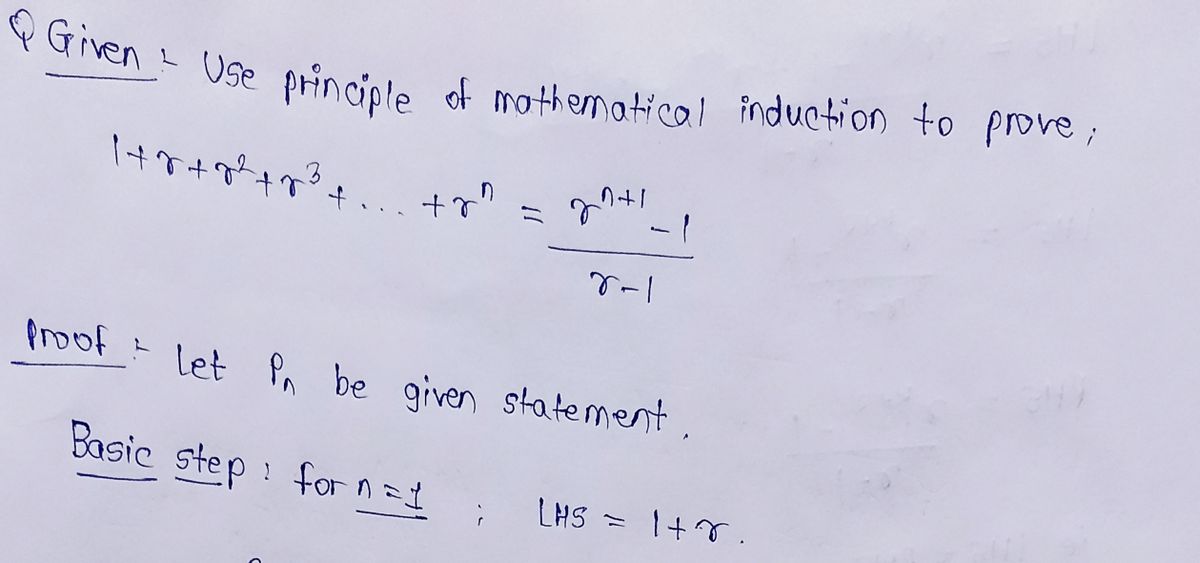Use the principle of mathematical induction to prove that 1 + r + r² +r³ + ... + µM =. pn+1 - r-1
Use the principle of mathematical induction to prove that 1 + r + r² +r³ + ... + µM =. pn+1 - r-1
Advanced Engineering Mathematics
10th Edition
ISBN:9780470458365
Author:Erwin Kreyszig
Publisher:Erwin Kreyszig
Chapter2: Second-order Linear Odes
Section: Chapter Questions
Problem 1RQ
Related questions
Question
![**Mathematical Induction on Geometric Series**
**Problem Statement:**
Use the principle of mathematical induction to prove that:
\[ 1 + r + r^2 + r^3 + \ldots + r^n = \frac{r^{n+1} - 1}{r - 1} \]
**Explanation:**
This problem involves proving a formula for the sum of a geometric series using mathematical induction. The left side of the equation represents a geometric series with first term 1 and common ratio \( r \), extending up to \( r^n \). The right side of the equation is the closed form expression of this series.
**Steps for Mathematical Induction:**
1. **Base Case:** Verify the formula for \( n = 1 \).
2. **Inductive Step:** Assume the formula holds for \( n = k \), i.e.,
\[ 1 + r + r^2 + \ldots + r^k = \frac{r^{k+1} - 1}{r - 1} \]
3. **Prove for \( n = k+1 \):** Show that
\[ 1 + r + r^2 + \ldots + r^k + r^{k+1} = \frac{r^{k+2} - 1}{r - 1} \]
By completing these steps, you show that the formula holds for all integers \( n \geq 1 \).
This mathematical proof technique is powerful for proving statements or formulas that are supposed to be true for all integers in a specified range.](/v2/_next/image?url=https%3A%2F%2Fcontent.bartleby.com%2Fqna-images%2Fquestion%2Fe7a1580d-b0b0-434b-847e-741d03f01d82%2Ffd3f48d4-2d8c-4538-bb65-f25a4f0996aa%2Fbzkhs8d_processed.jpeg&w=3840&q=75)
Transcribed Image Text:**Mathematical Induction on Geometric Series**
**Problem Statement:**
Use the principle of mathematical induction to prove that:
\[ 1 + r + r^2 + r^3 + \ldots + r^n = \frac{r^{n+1} - 1}{r - 1} \]
**Explanation:**
This problem involves proving a formula for the sum of a geometric series using mathematical induction. The left side of the equation represents a geometric series with first term 1 and common ratio \( r \), extending up to \( r^n \). The right side of the equation is the closed form expression of this series.
**Steps for Mathematical Induction:**
1. **Base Case:** Verify the formula for \( n = 1 \).
2. **Inductive Step:** Assume the formula holds for \( n = k \), i.e.,
\[ 1 + r + r^2 + \ldots + r^k = \frac{r^{k+1} - 1}{r - 1} \]
3. **Prove for \( n = k+1 \):** Show that
\[ 1 + r + r^2 + \ldots + r^k + r^{k+1} = \frac{r^{k+2} - 1}{r - 1} \]
By completing these steps, you show that the formula holds for all integers \( n \geq 1 \).
This mathematical proof technique is powerful for proving statements or formulas that are supposed to be true for all integers in a specified range.
Expert Solution
Step 1

Step by step
Solved in 3 steps with 3 images

Recommended textbooks for you

Advanced Engineering Mathematics
Advanced Math
ISBN:
9780470458365
Author:
Erwin Kreyszig
Publisher:
Wiley, John & Sons, Incorporated

Numerical Methods for Engineers
Advanced Math
ISBN:
9780073397924
Author:
Steven C. Chapra Dr., Raymond P. Canale
Publisher:
McGraw-Hill Education

Introductory Mathematics for Engineering Applicat…
Advanced Math
ISBN:
9781118141809
Author:
Nathan Klingbeil
Publisher:
WILEY

Advanced Engineering Mathematics
Advanced Math
ISBN:
9780470458365
Author:
Erwin Kreyszig
Publisher:
Wiley, John & Sons, Incorporated

Numerical Methods for Engineers
Advanced Math
ISBN:
9780073397924
Author:
Steven C. Chapra Dr., Raymond P. Canale
Publisher:
McGraw-Hill Education

Introductory Mathematics for Engineering Applicat…
Advanced Math
ISBN:
9781118141809
Author:
Nathan Klingbeil
Publisher:
WILEY

Mathematics For Machine Technology
Advanced Math
ISBN:
9781337798310
Author:
Peterson, John.
Publisher:
Cengage Learning,

